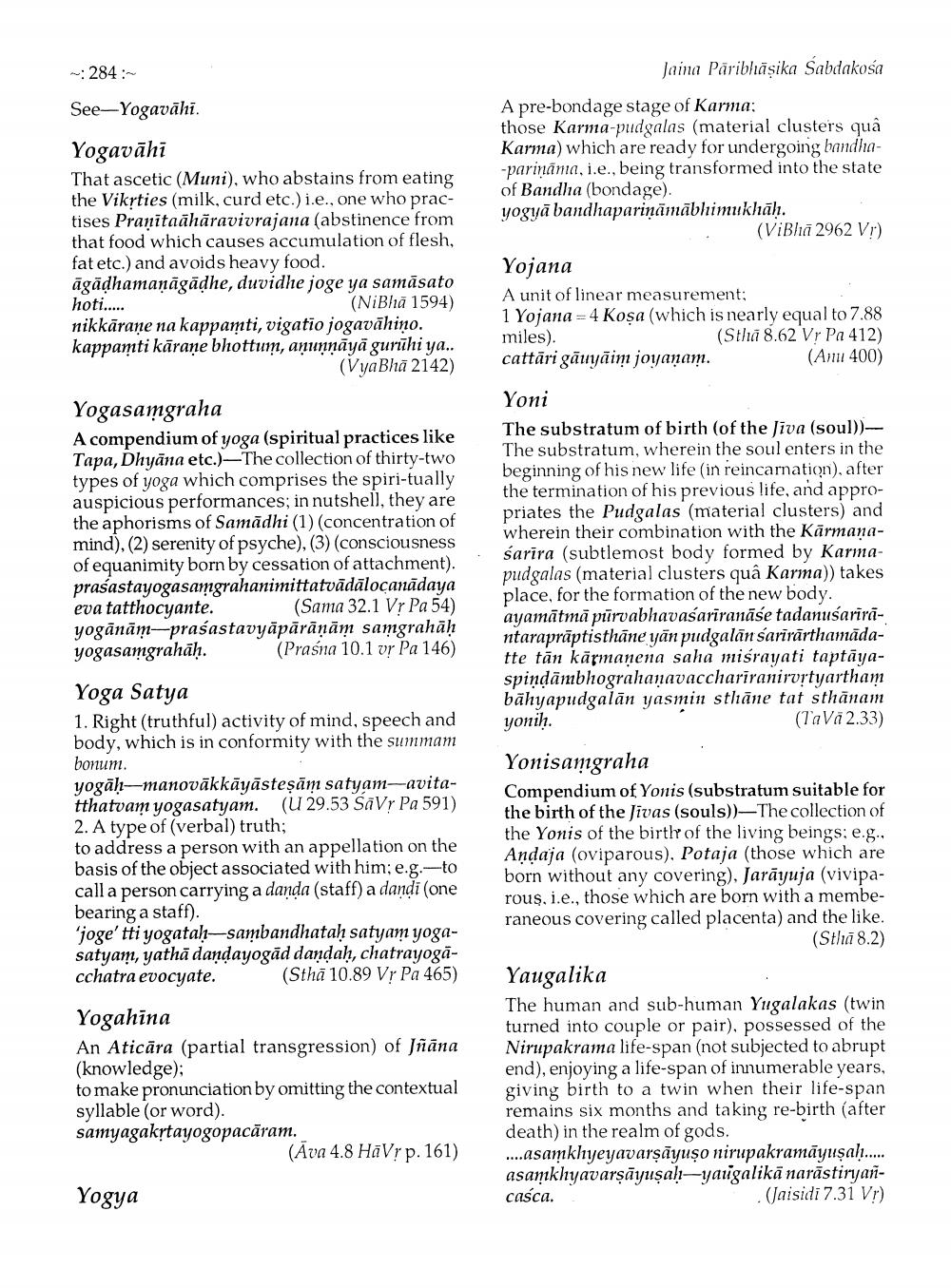________________
~:284:~
See-Yogavāhi.
Yogavähi
That ascetic (Muni), who abstains from eating the Vikṛties (milk, curd etc.) i.e., one who practises Pranitaähäravivrajana (abstinence from that food which causes accumulation of flesh, fat etc.) and avoids heavy food. ägäḍhamanagadhe, duvidhe joge ya samasato (NiBha 1594) nikkarane na kappamti, vigatio jogavāhiņo. kappamti kärane bhottum, anunayā gurāhi ya... (VyaBhā 2142)
hoti.....
Yogasangraha
A compendium of yoga (spiritual practices like Tapa, Dhyana etc.)-The collection of thirty-two types of yoga which comprises the spiri-tually auspicious performances; in nutshell, they are the aphorisms of Samadhi (1) (concentration of mind), (2) serenity of psyche). (3) (consciousness. of equanimity born by cessation of attachment). prasastayogasamgrahanimittatvādāloçanādaya
eva tatthocyante. (Sama 32.1 Vr Pa 54) yoganām prasastavyāpārāṇām samgrahaḥ yogasamgrahah. (Praśna 10.1 vr Pa 146)
Yoga Satya
1. Right (truthful) activity of mind, speech and body, which is in conformity with the summam bonum.
yogah-manoväkkäyästeṣām satyam-avitatthatvam yogasatyam. (U 29.53 SaVr Pa 591) 2. A type of (verbal) truth;
to address a person with an appellation on the basis of the object associated with him; e.g-to call a person carrying a danda (staff) a dandi (one bearing a staff).
'joge' tti yogataḥ-sambandhataḥ satyam yogasatyam, yatha daṇḍayogad dandaḥ, chatrayogacchatra evocyate. (Stha 10.89 Vr Pa 465)
Yogahina
An Aticära (partial transgression) of Jñana (knowledge);
to make pronunciation by omitting the contextual syllable (or word). samyagakṛtayogopacāram.
(Ava 4.8 HaVrp. 161)
Yogya
Jaina Paribhāṣika Sabdakosa
A pre-bondage stage of Karma those Karma-pudgalas (material clusters quà Karma) which are ready for undergoing handha-parināma, i.e., being transformed into the state of Bandha (bondage).
yogya bandhapariņāmābhimukhäh.
(ViBha 2962 Vr)
Yojana
A unit of linear measurement;
1 Yojana-4 Kosa (which is nearly equal to 7.88 miles). (Stha 8.62 Vr Pa 412) (Anu 400)
cattari gāyāim joyaṇam.
Yoni
The substratum of birth (of the Jiva (soul))The substratum, wherein the soul enters in the beginning of his new life (in reincamation), after the termination of his previous life, and appropriates the Pudgalas (material clusters) and wherein their combination with the Karmaṇasarira (subtlemost body formed by Karmapudgalas (material clusters quà Karma)) takes place, for the formation of the new body. ayamatma pürvabhavasariranase tadanusarinintarapräptisthane yan pudgalan sarirarthamadatte tän kärmanena saha miśrayati taptayaspindämbhograhayavacchariraniroṛtyartham bahyapudgalan yasmin sthane tat sthanam yonih. (TaVa 2.33)
Yonisamgraha
Compendium of Yonis (substratum suitable for the birth of the Jivas (souls))-The collection of the Yonis of the birthr of the living beings; eg. Andaja (oviparous). Potaja (those which are born without any covering), Jarayuja (viviparous, i.e., those which are born with a memberaneous covering called placenta) and the like. (Sthi 8.2)
Yaugalika
The human and sub-human Yugalakas (twin turned into couple or pair), possessed of the Nirupakrama life-span (not subjected to abrupt end), enjoying a life-span of innumerable years, giving birth to a twin when their life-span remains six months and taking re-birth (after death) in the realm of gods. ....asamkhyeyavarṣayuşo nirupakramayuṣaḥ...... asamkhyavarṣayusah-yaugalika narastiryan(Jaisidi 7.31 Vr)
casca.




